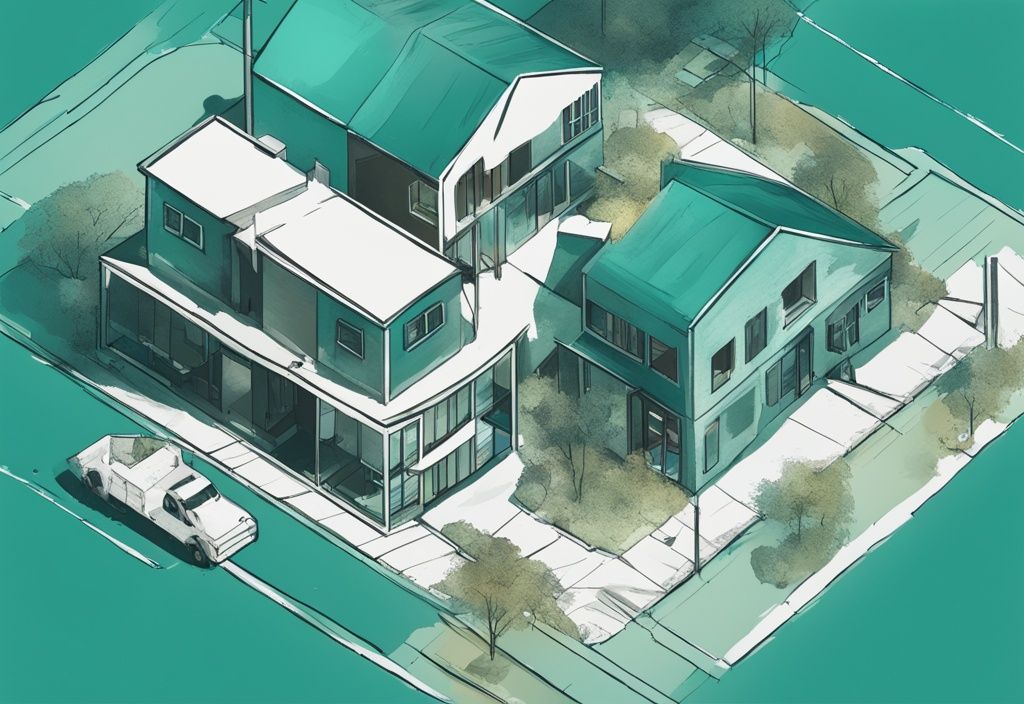Stepping into the realm of real estate development? Eager but slightly befuddled about how to transform from your current role to a property magnate? Fret not; your catalyst to success is right here. Welcome to your one-stop guide on how to become a real estate developer.
This journey through the labyrinth of land acquisition, complex financing, and intricate property laws might seem daunting, but remember, every grand building once started with a single brick. Together, we’ll delve into the nitty-gritty—ranging from indispensable education and certifications to comprehending the market pulse and legal obligations—all simplified for your ease.
No matter if you’re stepping in afresh, or an experienced shark seeking to switch currents, this step-by-step guide will equip you with the tools you need to navigate the enticing yet challenging waters of real estate development. Time to grab that hard hat and get building!
Understanding Real Estate Development: What Does a Developer Do?
Real estate development is a multifaceted process involving the construction, renovation, and sale of various property types. It encompasses everything from residential homes and commercial spaces to industrial properties and urban developments. Learning how to become a real estate developer means diving into these core elements and the roles developers play in orchestrating these projects.
Real estate developers are essentially entrepreneurs who take on the risks and rewards of developing properties. They are visionaries who plan, coordinate, and oversee the entire lifecycle of property development. From architecture and design to public relations and sales, developers manage diverse tasks to ensure the project’s success. Knowing the comprehensive role developers play can be key for anyone wondering how to become a real estate developer.
The journey begins with land acquisition. Developers either purchase land or form strategic partnerships with landowners. This involves identifying profitable locations, negotiating purchase terms, and securing ownership or usage rights. What follows are market studies, enabling developers to gauge project feasibility, identify target markets, and anticipate demand. This critical step ensures that the development aligns with market needs and investment goals.
Once the land is secured, developers create detailed development plans. These plans outline project design, timelines, financial projections, and marketing strategies. Approval and permits from local authorities are essential next steps. Navigating zoning laws, environmental regulations, and building codes are crucial for legal compliance and project viability.
Project financing is another critical area. Developers must secure funds to cover the extensive costs associated with construction, labor, and materials. This can be achieved through personal savings, loans, or attracting investors. Effective financial planning and management are vital for keeping the project on track and within budget.
During the construction phase, developers oversee every aspect, ensuring that the project meets quality standards and stays on schedule. This involves coordinating with contractors, architects, engineers, and other professionals. Attention to detail in this phase helps avoid costly delays and quality issues.
Renovations are also part of real estate development, particularly for projects involving the rehabilitation of existing structures. Developers must assess the condition of the property, plan necessary upgrades, and execute renovations to enhance property value and appeal.
In summary, understanding how to become a real estate developer requires knowledge in several crucial areas:
- Land acquisition
- Market analysis
- Securing permits
- Project financing
- Construction management
- Renovations
Mastering these components can set the foundation for a successful career in real estate development.
Fundamental Steps to Become a Real Estate Developer
Acquiring the right education, understanding licensing, and mastering property laws are essential steps in the journey to becoming a successful real estate developer. Here’s a closer look at each key area:
Getting the Right Education: Degrees and Certifications
Relevant Degree Programs
To kickstart your path on how to become a real estate developer, obtaining the right education is crucial. While it’s not a strict requirement, degrees in law, finance, or architecture can create a solid foundation by offering vital insights into areas like contract negotiation, financial analysis, and structural design.
A business degree, particularly an MBA, opens doors to a broader understanding of operations and networking opportunities. Degrees specifically focused on real estate, construction management, urban development, finance, and related business fields also impart practical knowledge and skills, setting you up for success in the sector.
Beneficial Certifications for Developers
In addition to formal education, certifications play a pivotal role. Recognized credentials from institutions like NAIOP (Commercial Real Estate Development Association), SRS (Seller Representative Specialist), CCIM (Certified Commercial Investment Member), and GRI (Graduate, REALTOR Institute) enhance your expertise and marketability.
Continuing education is equally important for staying competitive and knowledgeable about industry trends. Regular participation in certified courses or workshops helps keep you up-to-date with the latest developments and best practices, ensuring you remain a top contender in the real estate market.
Getting Familiar with Licensing and Legal Requirements
State-specific Developer Licenses and Real Estate License
Being aware of the licensing and legal requirements in your region is essential. Many states require a real estate license, which involves completing specific coursework and passing an exam. Some states also require a real estate developer license, with varying requirements.
Researching your area’s specific regulations ensures you’ll be well-prepared for any necessary exams. These licenses not only legitimize your operations but also build trust with clients and partners, reinforcing your credibility in the industry.
Navigating Property Laws: Zoning and Environmental Regulations
Understanding property laws, including zoning and environmental regulations, is vital, as the real estate development process is jam-packed with detail-oriented and deadline-driven work involving numerous parties, which can be explored further in this insightful article on the [real estate development process](https://www.dealpath.com/blog/real-estate-development-process-scaling/). Zoning laws dictate land use, affecting the types of permissible developments in different areas. Environmental regulations ensure developments do not negatively impact the environment.
Being familiar with these laws helps you identify feasible sites, secure necessary permits, and avoid legal complications. Collaborating with local authorities and legal experts can further aid in navigating this complex landscape successfully.
By focusing on acquiring relevant education and certifications, understanding licensing requirements, and mastering property laws, you lay a robust foundation for a thriving career in real estate development.
Gaining Industry Experience for Real Estate Development
Learning how to become a real estate developer can feel like a complex puzzle, but gaining hands-on industry experience is one of the key pieces that can make the picture much more manageable.
Top Roles to Start Building Experience
One of the essential steps on how to become a real estate developer is to gain relevant industry experience. Here are some ideal entry-level roles to consider:
- Real Estate Agent: Becoming a real estate agent puts you right at the heart of the property market. You’ll get a firsthand look at how properties are bought and sold, learn the ropes of client interactions, and master the basics of real estate transactions. It’s like getting a backstage pass to understand how property sales and marketing really work.
- Intern: Securing an internship at a real estate development company is like lifting the veil on the industry. You’ll be able to witness and participate in different project stages, from planning to completion. This kind of immersion gives you invaluable, hands-on experience that a classroom simply can’t offer.
- Property Manager: When you manage properties, you get to see another crucial side of real estate—operations and tenant relations. You’ll gain insights into the day-to-day management, maintenance, and operational aspects of real estate that are essential for any aspiring developer to understand.
- Development Company Employee: Working directly for a real estate development company can be a significant advantage. Whether it’s in project management, financial analysis, or overseeing construction, these roles give you a comprehensive look at the entire industry. This experience becomes your toolkit, filled with practical knowledge to tackle future projects.
Importance of Networking and Building Professional Relationships
Establishing a solid network is crucial in the journey of how to become a real estate developer. Building these professional relationships can unlock numerous opportunities and offer essential industry insights.
How to Create a Strong Network in the Industry
Networking can often feel daunting, but here’s how you can break it down and make it a seamless part of your professional growth:

- Industry Professionals: Connect with brokers, contractors, and land-use attorneys. These key industry players can provide you with invaluable insights, practical advice, and even opportunities for collaboration on projects.
- Networking Events: Attend real estate conferences, seminars, and workshops. These gatherings are golden opportunities to meet like-minded professionals. Plus, staying informed on industry trends is always a good idea.
- Join Professional Organizations: Consider joining organizations like NAIOP or ULI. Membership offers access to resources, training, and a community of professionals. Being part of such groups can significantly bolster your industry knowledge and connections.
- Consultancies: Engaging with real estate consultancies can be another fruitful avenue. These firms often provide advisory services and can introduce you to critical contacts within the industry. They can also be a great source of mentorship and guidance.
- Continuous Learning: Never stop learning. Regularly participate in certified courses or workshops. This not only broadens your expertise but also helps you meet other professionals and specialists who can support your career path.
Building a strong network and gaining practical experience are pivotal steps in how to become a real estate developer. These elements equip you with the knowledge, skills, and connections needed to navigate the complex landscape of real estate development effectively.
Key Skills Required to Become a Real Estate Developer
Mastering Organizational, Leadership, and Analytical Skills
To truly grasp how to become a real estate developer, honing your organizational, leadership, and analytical skills is essential. Real estate development projects are intricate, demanding meticulous planning and coordination. A knack for organization keeps every facet of a project on track, helping you manage schedules, deadlines, and resources.
Effective teamwork is vital. You’ll be collaborating with architects, contractors, and legal experts, so your organizational prowess will play a crucial role.
On the analytical front, it’s about more than just numbers. Assessing market trends, executing feasibility studies, and making data-driven decisions are all part of the job. These skills help you spot profitable opportunities while mitigating risks. Your financial literacy—a vital part of your analytical toolkit—enables you to manage budgets, forecast outcomes, and create profitable ventures.
Leadership skills are your guiding force, steering your team throughout each project’s lifecycle. Strong leadership resolves conflicts, maintains team morale, and ensures project milestones are met. Equally important are communication and negotiation skills. As a developer, you’ll negotiate with stakeholders, secure permits, and update investors and clients. Good leaders also excel at motivating teams and driving projects to successful completion.
Developing Solid Financial Literacy and Marketing Strategies
Mastering financial literacy is a cornerstone of learning how to become a real estate developer. A solid financial foundation helps you secure funds through personal savings, loans, or investors. Understanding financing mechanisms such as commercial loans and real estate syndications is crucial. This knowledge includes identifying suitable financial institutions, crafting persuasive business proposals, and adhering to financing agreements.
Effective financial management ensures projects stay within budget and achieve desired profit margins. You’ll need to forecast expenses, manage cash flow, and make informed financial decisions. Real estate developers often leverage financial instruments and investments to maximize returns.
Marketing strategies are equally vital. From the get-go, developers need to market their projects effectively to attract investors and buyers. This involves market research to understand target demographics, crafting appealing property listings, and utilizing digital marketing tools. A well-planned marketing strategy can significantly enhance your project’s visibility and desirability.
It’s important to continually update your marketing tactics to align with changing market trends and technological advancements. This blend of financial expertise and strategic marketing is key to building a successful career in real estate development.
Insightful Steps to Kickstart Your Real Estate Development Career
Embarking on a real estate development career requires careful planning and strategic goals. This section covers essential aspects to ensure you navigate this journey effectively.
Creating Your Real Estate Development Checklist
Developing a comprehensive checklist is essential for anyone aiming to understand how to become a real estate developer. This tool will guide you through each stage of the process, ensuring nothing is overlooked.
- Set Progressive Goals: Establish clear, achievable milestones to maintain momentum in your development journey. Break down larger objectives into manageable tasks to track your progress effectively.
- Start Small: Begin with smaller projects to gain hands-on experience and understand the intricacies of real estate development. This approach minimizes risk and allows for gradual scaling as you acquire more knowledge and confidence.
- Create a Comprehensive Development Plan: This plan should include detailed timelines, realistic financial projections, and up-to-date market data. A well-structured development plan serves as a roadmap, helping you navigate the complexities of real estate projects with clarity and precision.
Identifying Your Specialty and Setting Goals
Early in your career, defining your niche in real estate development is crucial for sustained success.
- Identify Your Specialty: Determine which area of real estate development aligns with your interests and strengths. Whether it’s residential, commercial, or mixed-use properties, specializing enables you to develop expertise and a competitive edge in a specific market segment.
- Set Strategic Goals: Outline both short-term and long-term objectives tailored to your chosen specialty. Having clear goals helps you maintain focus, measure progress, and make informed decisions. Regularly reassess and adjust these goals as needed to stay on track and responsive to market dynamics.
Integrating these steps into your career planning will provide a strong foundation as you learn how to become a real estate developer. Ensure your checklist is thorough and aligned with your professional goals to navigate the path to success effectively.
Financing and Marketing Tips for Your Real Estate Projects
Securing the necessary financing is one of the most critical steps in how to become a real estate developer. There are several primary avenues for acquiring funds, and understanding these options can significantly enhance your success rate.
Best Finance Options: Loans and Real Estate Syndications
Securing the necessary financing is one of the most critical steps in how to become a real estate developer. There are several primary avenues for acquiring funds, and understanding these options can significantly enhance your success rate.
Commercial loans are a traditional route, where financial institutions provide large sums designed specifically for real estate projects. These loans often come with strict qualification requirements and substantial interest rates, so it’s crucial to have a strong credit history and a solid business plan.
Real estate syndications offer another viable option. In syndications, multiple investors pool their resources to fund a single project, mitigating individual risks while increasing the equity pool. This approach is particularly beneficial for new developers who may struggle to secure commercial loans due to lack of experience or collateral.
For those just starting, partnering with experienced developers can be invaluable. An established developer can vouch for the project, making financial institutions and investors more likely to provide the necessary funds. Co-sponsoring projects can also split the financial burden, making the daunting task of securing initial financing more manageable.
Top Marketing Strategies for Real Estate Developers
Effective marketing is essential from the onset and throughout the life of a project. To master this aspect of how to become a real estate developer, consider these top strategies:
- Digital Presence: Establish a robust online presence. Create a professional website showcasing your projects, expertise, and client testimonials. Use social media platforms like LinkedIn, Facebook, and Instagram to promote new developments, share progress updates, and engage with your audience.
- Content Marketing: Leverage content marketing by regularly posting informative blog articles, market analysis, and industry insights. This not only positions you as an expert in the field but also improves your website’s search engine ranking, attracting potential buyers and investors.
- Email Campaigns: Implement effective email marketing campaigns to keep interested parties informed about new developments, milestones, and investment opportunities. Personalized emails can nurture leads and maintain engagement throughout the project lifecycle.
- Networking Events: Participate in real estate conventions, trade shows, and local business events. Networking is an excellent way to create professional relationships, gain insights, and promote your projects directly to potential investors and buyers.
- High-Quality Visuals: Invest in high-quality visuals such as 3D renderings, professional photography, and virtual tours. These tools offer potential buyers a realistic view of the project, helping them make informed decisions.

By combining these marketing tools with a strong financial strategy, mastering how to become a real estate developer becomes a much more structured and attainable goal. Each step taken in developing a project’s marketing and financing strategies solidifies your growing reputation and expertise in the real estate market.
How to Become a Real Estate Developer: Leveraging Market Trends for Maximum Profit
Staying Updated with Market Trends
To become a successful real estate developer, it’s crucial to research market trends regularly. This involves keeping an eye on factors such as economic changes, interest rates, and demographic shifts. Regularly reading industry reports, subscribing to real estate journals, and engaging with online real estate communities can provide valuable insights.
Keeping up-to-date allows developers to anticipate changes, make strategic decisions, and ultimately, maximize profit while minimizing risks.
Understanding Local Market Dynamics
Local market dynamics play a pivotal role in real estate development. Developers should delve into aspects such as migration trends, business growth, rental rates, and local authority approvals. For instance, areas experiencing high migration rates often signal a growing demand for housing, making them attractive for new developments.
Understanding business growth can indicate potential hotspots for commercial real estate projects. Rental rates provide insights into the viability of rental properties, while local authority approvals are essential for ensuring compliance with zoning and environmental regulations.
Analyzing Migration Trends
Migration trends are key indicators of real estate opportunities. Developers must track where people are moving to and from, understanding the factors driving these migrations. Areas with increasing inbound migration often present lucrative opportunities for residential, commercial, or mixed-use developments. By leveraging migration data, developers can strategically invest in areas with anticipated population growth.
Imagine knowing where the next hotspot is before everyone else does!
Monitoring Business Growth
Business growth within a locality can greatly influence real estate dynamics. Regions with a surge in new businesses or expansions of existing ones often experience a rise in demand for commercial and residential properties.
Identify growing industries and businesses in a region to tailor projects accordingly, ensuring they meet the market’s needs and capitalize on economic growth. Think of it like planting seeds where the soil is most fertile—strategic and rewarding.
Evaluating Rental Rates
Rental rates are a direct reflection of the demand and supply within a real estate market. Understanding the local rental market helps developers assess the financial viability of rental properties. Higher rental rates can indicate a strong demand, suggesting that new residential or commercial rentals could be highly profitable.
Conversely, stagnant or declining rental rates may signal an oversaturated market or reduced demand. It’s like reading a thermometer for the market’s health!
Navigating Local Authority Approvals
Local authority approvals, including zoning and environmental regulations, are crucial for the successful completion of any real estate development project. Understanding these rules helps developers avoid legal issues and ensure their projects are compliant with local laws.
Knowledge of zoning regulations helps in selecting appropriate sites, while awareness of environmental regulations ensures sustainable and legally sound developments. This is akin to having a map and compass in uncharted territory—you’ll navigate obstacles more smoothly. To better understand site value, it’s beneficial to explore what plottage means in real estate and how it can impact property value.
By thoroughly understanding and leveraging these market trends, aspiring real estate developers can make informed decisions that enhance profitability and reduce risks. Constant learning and adaptation to market changes are essential for long-term success in the competitive field of real estate development.
Constant adaptation ensures you’ll remain ahead in the ever-evolving real estate landscape. So keep learning, stay curious, and let the market trends guide your way to success!
Career Paths for Real Estate Developers
Exploring the various career paths within real estate development helps clarify which direction aligns best with your skills and interests. Understanding these roles is a key step in how to become a real estate developer, offering insight into the dynamic opportunities available.
Common Roles in Real Estate Development
Real estate development is a multifaceted field brimming with diverse career paths. Here are some pivotal roles to consider on your journey to becoming a real estate developer:
- Architectural Designer: Designs plans that marry aesthetics with functionality, ensuring buildings are both beautiful and practical.
- Project Manager: Manages the entire development process, making sure projects are completed on time and within budget parameters.
- Sales Associate: Focuses on marketing and selling the developed properties, connecting buyers with properties that meet their investment goals.
- Investment Analyst: Evaluates the financial aspects of potential projects, conducting thorough market and financial analyses.
- Broker: Serves as a mediator between buyers and sellers, facilitating negotiations and property sales.
- Asset Management Specialist: Works to maximize the value and performance of real estate assets over time, ensuring long-term profitability.
- Consultant: Offers expert advice on various development stages, from site selection to project execution, guiding developers through complex landscapes.
- Risk Officer: Identifies and manages potential risks in real estate projects, ensuring compliance and mitigating financial losses.
Pros and Cons of Working Independently vs. for a Company
Deciding whether to work independently or for a company is a crucial part of figuring out how to become a real estate developer. Both paths have unique advantages and challenges:
-
Working Independently:
- Pros: Enjoy greater control over your projects with the flexibility to make fast decisions. You’ll also relish the potential for higher financial rewards.
- Cons: Be prepared to self-fund your ventures or gain investor trust, handle higher risks, and rely heavily on your networking abilities and expertise.
-
Working for a Company:
- Pros: Benefit from established resources, receive mentorship from seasoned professionals, and enjoy financial stability along with structured career growth.
- Cons: Trade off some autonomy in selecting projects, encounter potential limits on innovation, and possibly face slower career progression.
Understanding these distinctions will help you navigate your career path, aligning it with your goals and financial situation. Leveraging these insights is essential in mastering how to become a real estate developer, providing a clearer direction on your professional journey.
Overcoming Challenges in Real Estate Development
Real estate development is a multifaceted endeavor that demands not only ingenuity but also strategic planning and effective project management. For those looking into how to become a real estate developer, understanding the hurdles you might face and planning how to overcome them is crucial.
Securing Financing
One of the primary challenges for new developers is securing adequate financing. Since this sector is capital-intensive, obtaining funding can be a daunting task. It’s like setting up a lemonade stand, but instead of lemons and sugar, you need a big bucket of cash. One effective approach is to form partnerships with seasoned developers who can provide both financial backing and valuable experience. Partnering up is like having a big sibling around—they’ve been through it and can help guide the way.

Alternatively, consider co-sponsoring projects, which can mitigate financial risks while offering practical insights into the development process. Think of it as having a business buddy; you share the highs, the lows, and the investment, making the journey a tad easier and way more insightful.
Identifying Feasible Sites
Another critical aspect of real estate development is the ability to identify multiple feasible sites. This involves an in-depth evaluation of various factors, including market demand, property value, and potential for growth. Picture it as gardening; you need to find the right soil (location) and know what kind of plants (developments) will flourish there.
Thorough underwriting is essential to understand the financial viability of a site. This includes performing detailed market studies and assessing costs related to acquisition, construction, and renovation. It’s like doing homework before a big test—you need all the facts to make the right decisions.
Navigating Zoning and Environmental Regulations
Understanding zoning laws and environmental regulations is key to ensuring compliance and avoiding legal pitfalls. Zoning laws determine the permissible use of a piece of land and can significantly impact the type and scale of a development project. Picture zoning laws like a rulebook for a board game; knowing the rules helps you play effectively.
Environmental regulations, on the other hand, ensure that the development does not adversely affect the surrounding natural environment. To navigate these complexities, it’s crucial to consult with legal and environmental experts who can provide valuable guidance from the planning stages through to project completion. This is your legal GPS—guiding you through potential roadblocks and ensuring you stay on the right path.
Integrating all these elements seamlessly is a testament to a developer’s skill and foresight. By focusing on securing financing, identifying feasible sites, and navigating regulatory landscapes, you can enhance your chances of success. This holistic approach is how you truly grasp how to become a real estate developer, turning dreams into tangible properties.
FAQs: Real Estate Development Career
Embarking on a career in real estate development can be an exciting yet complex journey. Below are some common questions and key insights on how to become a real estate developer.
Timeframe for Becoming a Real Estate Developer?
Becoming a real estate developer typically takes around seven years. This includes time spent on education, gathering relevant experience, and cultivating a professional network. Think of it like growing a tree—you plant the seed, nurture it, and eventually, it bears fruit.
Do You Need a Degree to Become a Real Estate Developer?
A degree isn’t a must, but it can be highly beneficial. Pursuing studies in law, finance, or architecture can provide a solid foundation. Consider it a toolkit— the more tools you have, the better prepared you’ll be. An MBA can further enhance your skills and open doors to crucial networking opportunities.
Key Skills for Success in Real Estate Development
To thrive in real estate development, a variety of skills are essential:
- Organization and teamwork
- Analytical abilities and financial literacy
- Research and marketing expertise
Additionally, strong interpersonal skills are crucial:
- Communication
- Negotiation
- Leadership
These skills work together like pieces of a puzzle, each one completing the bigger picture of success in this field.
Possible to Become a Real Estate Developer with No Financial Backing?
Absolutely. Building relationships with investors and financial institutions can help you secure the necessary backing, even if you don’t have personal funds to start with. It’s like going on a road trip with friends—sometimes, you just need a bit of support to get where you’re going.
Easiest Route to Starting a Real Estate Development Career?
Gaining industry experience and networking are key to kick-starting your career:
- Start as a real estate agent, intern, or property manager to get hands-on experience
- Network with industry professionals, such as brokers, contractors, and land-use attorneys
Consider these initial steps as laying the building blocks of your career—each one takes you closer to your goal.
Conclusion
Becoming a real estate developer is a multifaceted journey that involves more than just purchasing land and constructing buildings. It’s a career that requires a blend of education, extensive networking, hands-on experience, and a diverse skill set. To understand how to become a real estate developer, one must dive deeply into various aspects that define this field. Additionally, gaining insight into industry challenges such as what is redlining in real estate can provide a more comprehensive understanding of the real estate landscape.
First and foremost, obtaining the right education is crucial. While a degree in law, finance, or architecture isn’t mandatory, it can provide a solid foundation. Certifications and ongoing education further enhance one’s knowledge and keep skills updated in this ever-evolving industry.
A developer must thoroughly understand market and legal dynamics. This includes zoning laws, environmental regulations, and local codes, which are essential to avoid legal pitfalls. Financial literacy and marketing strategies are also vital. Knowing how to secure funds, whether through personal savings, loans, or real estate syndications, and how to market projects from their inception can make the difference between success and failure.
Networking is another cornerstone of becoming a successful real estate developer. Building and maintaining relationships with industry professionals such as brokers, contractors, and land-use attorneys can provide invaluable insights and opportunities. Consulting firms can also offer guidance, especially for those new to the field.
Practical experience is indispensable. Roles in real estate agencies, internships, property management, or positions within development companies offer exposure to the nuts and bolts of the industry. These roles allow aspiring developers to learn the ropes, understand industry standards, and develop a keen sense of market trends and project management.
Mastering organizational, leadership, and analytical skills is imperative. Effective project management, clear communication, and sharp negotiation tactics are essential attributes of successful developers. These skills help in creating a structured development plan, managing timelines, and ensuring that projects remain on track and within budget.
Lastly, planning and continuous learning are keys to success. Setting realistic, progressive goals, beginning with smaller projects to build experience, and assembling a detailed development plan are practical steps towards a thriving career in real estate development. Continuous education and staying updated with industry trends can provide an edge in this competitive field.
In summary, the path of how to become a real estate developer is paved with dedication, learning, strategic planning, and the ability to navigate through various challenges. Through education, networking, experience, and the right skill set, one can unlock the doors to a fulfilling and successful career in real estate development.
Hi, I’m Alex Harper, a real estate expert with over ten years of experience in property management and legal advice. My passion is making the often complicated world of real estate understandable. I share practical tips and simple solutions to help you make better decisions – whether you’re buying a home, renting or just want to learn more about the industry. With my knowledge and experience, I want you to feel well-informed and confident in your real estate projects. Let’s tackle this together!




